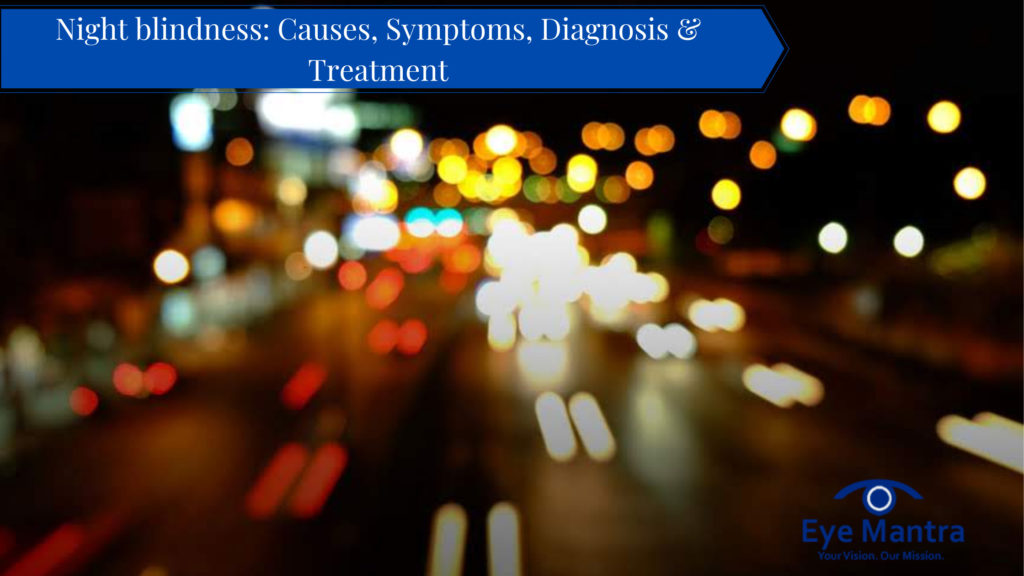Night blindness is the inability to see well at night or in dark light and is a serious problem of the retina. It is not a retinal disease but a vision problem. It is a type of visual impairment.
Blindness and night vision deficiency are very different. Night blindness is the result of vitamin A deficiency and is reversible or treatable. Mostly night blindness is treatable but there are cases in which there is a permanent vision loss. See your doctor for a major cause of your vision impairment. Once you understand the cause of the problem, you can take steps to correct your vision.
Contents
Causes of Night Blindness
The problem stems from the disruption of cells in your retina that enables you to see less light. It has many causes:
• Drugs that are used for glaucoma strengthening prevent the light from entering the eye.
• In some cases, the side effects of LASIK surgery are blurred at night and the presence of halos around the lights. There are tests to determine if this may occur before meeting LASIK.
• Vitamin A deficiency is a common cause of blindness. As deficiency means that rhodopsin, cannot be regenerated. Have proper eye nutrition to get the right eye vision.
• Diabetes is one of the major causes of blindness. If not taken care of, it can lead to the recurrence of diabetes.
• Zinc deficiency causes blindness. Zinc is a combination of essential nutrients for the eyes to absorb Vitamin A. • Also, too much sunlight can also damage the retina, pointing to reduced night vision.
Signs and Symptoms of Night Blindness
Symptoms of Night Blindness:
• Headaches
• Pain in the eye
• Nausea
• Blurred and cloudy vision
• Sensitivity to light
• Problem with remote viewing
• Walking around the house in the dim light is a challenge
• Driving at night seems to be very difficult • It is deceptive to see a face in dim light
Combined Risk Factors
Nutrients
Vitamin A Element Night blindness is often caused by a deficiency of vitamin A. It is estimated to be one of the symptoms leading to vitamin A deficiency.
Physical Health
Liver Problems Decreased night vision can be linked to a variety of diseases caused by liver dysfunction which in turn reduces vitamin A metabolism.
The Eyes
Retinitis Pigmentosa leads to the killing of visible sticks at the beginning of the disease. Nocturnal blindness in children is the first sign of retinitis pigmentosa.
Diagnosis
Some cases of blindness at night are treatable and others are not, depending on the cause of the disease. For no apparent reason, patients should visit an eye specialist for a check-up.
History
The surgeon will ask about the vision problem and ask about various aspects of the condition such as – Progression, duration, nutrition, eye surgery records, and much more.
Eye Exam
A night blind examination includes a detailed eye examination. Eye examinations include the following:
1. Test to measure optical sharpness, pupillary light reflex, and color vision.
2. Eyeglasses testing.
3. Slit Lamp Examination to get detailed information about different parts of our eyes. The anterior part includes the conjunctiva, cornea, eyelids, iris, lens, and sclera. Your doctor will use a torch-like instrument to study these parts carefully.
4. Your doctor might also use an ophthalmoscope to check for damage near the corner of the eye I.e. choroid, retina, vitreous, optic nerve, and retinal detachment. This test is called Retinal Examination.
Other Tests
The doctor may also request an Electroretinogram. It measures the responses of rods and lumps to light. Visual field tests can be performed to rule out the possibility of other conditions such as glaucoma or stroke.
Treatment for Night Blindness
• Often, night vision impairment involves working directly with the underlying condition that causes night vision.
• Myopia will be under check by the method of vision correction glasses or contact lenses.
• Cataract surgery is an easy way to eliminate eye blurring and improve vision and reduce night vision.
• Some medicines can cure night blindness such as Quinidine.
• The condition is permanent in people with birth and therefore, there is no equivalent cure. • Those experiencing Vitamin A deficiency should supplement vitamin A-rich food sources.
Prevention Tips
• Properly monitor your blood sugar levels.
• Eat nutritious food to eliminate night vision.
• Other orange food sources are high sources of Vitamin A.
1. Cantaloupes
2. Sweet potatoes
3. Carrots
4. Pumpkins
5. Pumpkin squash
6. Mango
7. Papaya
• Proper eye examination by an ophthalmologist.
Herbal Remedies
Remedies that can enhance night vision include:
• Bilberry
• Berries
• Dandelion
• Eyebrows
• Grape wedding berries
• Flower petals
• Queen Anne’s String
• Rose flower eyewash
Conclusion
If you have night blindness, you must take care to keep yourself and others safe.
Wearing sunglasses or a brimmed hat can assist in decreasing night blindness. You might face a lot of problems at starting but eventually, you will get used to the medication and will notice certain changes after some days. Make sure you consult an ophthalmologist as soon as you find any changes in your vision.
They will suggest the best for you. For advice and queries, visit our website www.eyemantra.in To book an appointment call +91-8851044355. Or mail us at [email protected]



